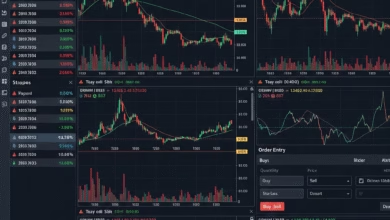Stock Exchange
Complete Guide to Investing in Stocks on National Stock Exchange of India Limited
Learn How to Invest in National Stock Exchange of India Limited

The National Stock Exchange of India Limited (NSE) is a powerhouse in the global financial landscape, offering US investors a chance to tap into one of the world’s fastest-growing economies. However, investing in foreign markets requires a nuanced approach. This guide simplifies the process, ensuring you can navigate the NSE with confidence.
Demystifying the NSE: Your Gateway to Indian Markets

- Understanding the NSE’s Significance:
- The NSE is India’s leading stock exchange, home to major companies and diverse sectors.
- It offers access to a burgeoning consumer market and a dynamic economy.
- Key NSE Indices:
- Familiarize yourself with the Nifty 50, India’s flagship index, which tracks the top 50 listed companies.
- Understanding the other major indexes can help create a diversified portfolio.
- Regulatory Environment:
- SEBI (Securities and Exchange Board of India) regulates the Indian market, ensuring transparency and investor protection.
- It is critical to be familiar with the regulations prior to investing.
Bridging the Gap: How US Investors Can Access the NSE

- Choosing the Right Broker:
- Select a US-based broker that offers access to international markets, including the NSE.
- Look for brokers with experience in facilitating trades in Indian equities.
- Compare brokerage fees, and any fees related to currency exchanges.
- Investment Vehicles:
- Consider investing through Exchange Traded Funds (ETFs) that track Indian indices.
- ADRs (American Depositary Receipts) of Indian companies listed on US exchanges provide another avenue.
- Navigating Currency Exchange:
- Understand the impact of currency fluctuations between the US dollar and the Indian rupee.
- Be aware of any fees associated with currency exchange.
Strategic Investment: Tips for Success in the NSE

- Due Diligence is Key:
- Thoroughly research companies and sectors before investing.
- Stay informed about India’s economic and political landscape.
- Diversification Strategies:
- Spread your investments across various sectors to mitigate risk.
- Consider a mix of large-cap and mid-cap stocks.
- Long-Term Perspective:
- Investing in emerging markets like India is often a long-term play.
- Avoid making impulsive decisions based on short-term market fluctuations.
Understanding Risk and Regulations: Crucial Factors
- Political and Economic Risks:
- Emerging markets can be more volatile than developed markets.
- Stay informed about potential political or economic changes in India.
- Tax Implications:
- Consult with a tax advisor to understand the tax implications of investing in foreign securities.
- Understand any tax treaties that may exist between the US and India.
- Regulatory differences:
- The regulatory environment of the NSE will be different than that of exchanges within the united states, so gaining an understanding of those differences is very important.
Staying Informed: Essential Resources for NSE Investors

- Reliable Financial News:
- Follow reputable financial news sources that cover the Indian stock market.
- Utilize resources provided by the NSE and SEBI.
- Financial Advisors:
- Consider consulting with a financial advisor experienced in international investing.
- Financial advisors can help to create a portfolio that alligns with personal financial goals.
- Online tools:
- Many online tools exist to help keep track of international markets, and can be helpful for those who wish to invest in the NSE.
Investing in the NSE offers a compelling opportunity to participate in India’s growth story. By understanding the intricacies of the Indian market and employing sound investment strategies, US investors can potentially reap significant rewards.





